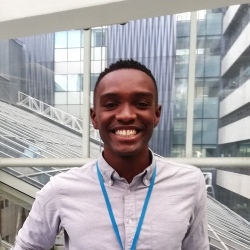Real-life story – Clinical Bioinformatician by Nana Mensah
- Programme
- STP
- Role
- Trainee
How I got into the role
Growing up I had always been the ‘techie’ of the house, fixing my family’s broken iPods, printers and PCs. I later bought a few textbooks online and I spent a little time every evening learning how to code. On those evenings, fixing the endless stream of mistakes in my software felt familiar. I was hooked. The problem-solving was in equal parts challenging, frustrating and rewarding.
I was accepted on the NHS Scientist Training Programme in 2017. At that time I had been working for almost two years as a research assistant in a government lab. Practical skills gained from my biomedical science degree were put to good use: culturing bacteria, testing for antimicrobial resistance and writing scientific reports.
What I do
I work as a trainee clinical bioinformatician. We use technical skills to manage, process and analyse clinical data across the health service. For example, those of us in physical sciences may deploy software for processing medical images. Working in health informatics, we may be consulted to improve patient data flow between systems. I specialise in genomic medicine, so the clinical data I work on results from sequencing a patient’s DNA. Clinicians rely on the analysis software pipelines we develop to make more informed decisions towards diagnosis and treatment of genetic conditions.
If you’re interested in this type of work, I’d recommend reaching out to people in the field.
The best bits and challenges
I’m very grateful for the opportunities my role has given me to develop professionally, many of which have resulted from the networks I’ve been exposed to. My scientific writing has improved, along with my presentation skills. I’ve had the chance to organise events, deliver workshops to staff and students, engage in journal clubs and content for social media.
There’s always something new to learn, which is a big challenge. In addition, NHS trusts are still adapting their infrastructure to the needs of software developers. Finally, coming from a research background, I was surprised by the regulations and audit processes in clinical science. But I quickly realised their importance. Patients are at the heart of our services so these systems ensure that standards are met and exceeded.
Life outside work
I’ve started reading more this past year, particularly popular science books covering biographies, innovations and latest developments in different specialisms. I’ve been drawn to them as I always gain a new perspective on the world. This of course translates to the way I approach my work. Alongside this I attend a public speaking club called Toastmasters which I would encourage everyone to try! It has stretched me in lots of ways.
The remainder of my time is spent seeing friends and family as often as possible.
Career plans and top tips for others
I highly recommend the clinical bioinformatics online course delivered by my lecturers at the University of Manchester. It’s brief but comprehensive and you leave with a clear overview of the field, its clinical applications and the various challenges. I tell everyone the same thing: hop on your computer and give it a go!
If you’re interested in this type of work, I’d recommend reaching out to people in the field. Many clinical bioinformaticians are active on Twitter and trainees like myself are more than happy to respond to specific questions. The demand for the profession is growing so it’s in our interest to raise awareness and expand the community of practice.
